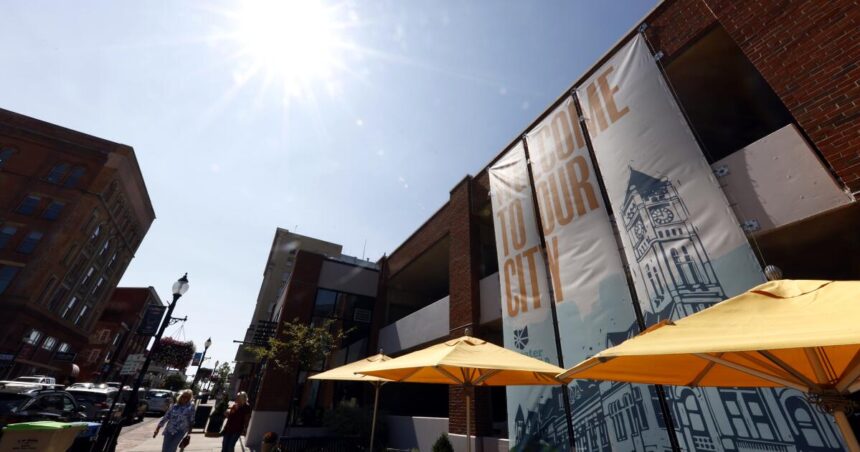Many cities have been reshaped by immigration in recent years without much attention, with Springfield, Ohio, being the exception.
The story of economic revival and the growing pains that come with it has been thrust into the national conversation in a presidential election year, distorted by tales of Haitian immigrants eating their neighbors’ pets. Donald Trump amplified those lies in his speech on Tuesday, exacerbating fears among some residents of deepening divisions in this mostly white, working-class city of about 60,000 people west of Columbus.
Many of the roughly 15,000 immigrants who arrived in recent years were attracted by good jobs and the city’s relatively low cost of living, Rose Tamar Joseph said Wednesday at the city’s Haitian Community Outreach Center. But anxiety is growing as longtime residents increasingly accuse the newcomers of taking factory jobs, driving up housing costs, disrupting traffic and straining city services.
“Some people say they are living in fear, some fear for their lives. It’s a tough situation for us,” Joseph said.
A “Welcome to Our City” sign hangs over a downtown parking lot. Coffee shops, bakeries and boutiques line the city’s main drag, North Fountain Avenue. A flag flutters from a nearby pole advertising “Culture Fest,” which the city describes as an annual event celebrating unity through diversity.
Melanie Flax Wilt, a Republican committeewoman for the county that includes Springfield, said she has been urging community and political leaders to “stop stoking fear.”
“After the election is over and everyone is no longer using Springfield, Ohio, as a forum for discussing immigration reform, we’re going to be here working through the challenges and coming up with the solutions,” she said.
Ariel Dominique, executive director of the Haitian American Democracy Foundation, said he’d laughed at the absurdity of the false allegations in recent days, but it was painful to see the Republican presidential candidate repeat the comments on national television.
“This is so unfair and unjust and completely antithetical to what we have contributed to the world and what we have contributed to this country for so many years,” Dominique said.
The misinformation about Haitian immigrants in Springfield was spread online by Trump’s running mate, Sen. J.D. Vance of Ohio, on the eve of Tuesday’s debate between President Trump and Vice President Kamala Harris. It is part of a long-standing American political tradition of portraying immigrants as outsiders.
“This is what’s happening in our country. It’s disgraceful,” Trump said after repeating the falsehood. When asked by ABC News host David Muir about the false claims, Trump remained adamant, saying “people on TV” were saying dogs were eaten but hadn’t provided any evidence.
Springfield city officials have sought to quell false alarms, saying they have not had any previous reports of pets being kidnapped or eaten, as state leaders try to address some of the real challenges facing the city.
Ohio’s Republican governor, Mike DeWine, said Tuesday that he would add millions of dollars in medical resources to the aid the state is already providing to Springfield, which is facing a surge in refugees from Haiti.
Many Haitians have come to the U.S. to escape poverty and violence. They have embraced Biden’s admissions mandate and avoided illegal border crossings, with just 92 Haitians apprehended at the border out of more than 56,000 in July, the most recent data available.
The Biden administration recently announced that an estimated 300,000 Haitians who were in the U.S. as of June 3 may be able to remain in the country with work authorization under a law called “Temporary Protected Status,” which protects them from deportation to conflict-torn countries.
Springfield, about 45 miles from the state capital, Columbus, saw a steep decline in manufacturing at the end of the last century, but its downtown has revitalized in recent years as Haitians moved there to fill a labor demand. Haitians now make up about 15 percent of the population, according to officials.
The city was shocked last year when an 11-year-old boy was killed when a minivan crashed into a school bus. The driver was a Haitian man who had recently immigrated to the area and was driving without a valid license. At a city council meeting on Wednesday, the boy’s parents accused politicians of using their son’s death to stoke hatred.
On September 6, a screenshot of a social media post was posted on social media platform X, which appeared to originate from Springfield, where a person’s “friend of the neighbor’s daughter” said they saw a cat being hung from a tree, butchered and eaten, and claimed without evidence that the home was inhabited by a Haitian person. The post was accompanied by a photo of a black man holding what appeared to be a goose by his feet.
On Monday, Vance posted on X, “Reports are that pets have been kidnapped and eaten by people who shouldn’t be in this country. Where are the border patrol agents?” The next day, he posted on X again about Springfield, saying his office had received calls from residents saying “neighborhood pets and local wildlife have been kidnapped by Haitian immigrants.” Of course, all of these rumors could be false.
Springfield, with its growing immigrant population, is no exception. According to U.S. Census Bureau statistics, immigration accounted for nearly three-quarters of the U.S. population growth over the past decade, with 2.5 million international immigrants expected to arrive in the U.S. between 2020 and 2023. Population growth is a key driver of economic growth.
“Haitian immigrants have been coming to Springfield for the past few years and have boosted the city’s economy and workforce,” said Guerin Joseph, executive director of the Haitian Bridge Alliance, which provides legal and social services to immigrants across the United States.
She said her Haitian clients in Springfield have told her they are now considering leaving the city out of fear.
Aftura Orsagos, Carr Smith and Spagat are Associated Press writers. Orsagos and Carr Smith reported from Springfield and Spagat from San Diego. Associated Press writers Michael Schneider in Orlando, Florida, and Noreen Nasir in New York contributed to this report.









